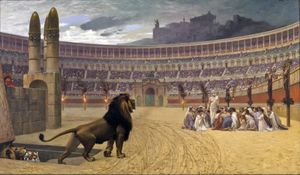303
| القرون: | قرن 3rd · قرن 4 · قرن 5 |
| العقود: | ع270 ع280 ع290 ع300 ع310 ع320 ع330 |
| السنوات: | 300 301 302 303 304 305 306 |
| ألفية: | الألفية 1 |
|---|---|
| قرون: | القرن 3 – القرن 4 – القرن 5 |
| عقود: | عقد 270 عقد 280 عقد 290 – عقد 300 – عقد 310 عقد 320 عقد 330 |
| سنين: | 300 301 302 – 303 – 304 305 306 |
| 303 حسب الموضوع | |
| السياسة | |
| زعماء الدول – الدول ذات السيادة | |
| تصنيفات المواليد والوفيات | |
| المواليد – الوفيات | |
| تصنيفات التأسيسات والانحلالات | |
| تأسيسات – انحلالات | |
| التقويم الگريگوري | 303 CCCIII |
| آب أوربه كونديتا | 1056 |
| التقويم الأرمني | N/A |
| التقويم الآشوري | 5053 |
| التقويم البهائي | −1541 – −1540 |
| التقويم البنغالي | −290 |
| التقويم الأمازيغي | 1253 |
| سنة العهد الإنگليزي | N/A |
| التقويم البوذي | 847 |
| التقويم البورمي | −335 |
| التقويم البيزنطي | 5811–5812 |
| التقويم الصيني | 壬戌年 (الماء الكلب) 2999 أو 2939 — إلى — 癸亥年 (الماء الخنزير) 3000 أو 2940 |
| التقويم القبطي | 19–20 |
| التقويم الديسكوردي | 1469 |
| التقويم الإثيوپي | 295–296 |
| التقويم العبري | 4063–4064 |
| التقاويم الهندوسية | |
| - ڤيكرام سامڤات | 359–360 |
| - شاكا سامڤات | 225–226 |
| - كالي يوگا | 3404–3405 |
| تقويم الهولوسين | 10303 |
| تقويم الإگبو | −697 – −696 |
| التقويم الإيراني | 319 ق.ر. – 318 ق.ر. |
| التقويم الهجري | 329 ق.هـ. – 328 ق.هـ. |
| التقويم الياباني | N/A |
| تقويم جوچى | N/A |
| التقويم اليوليوسي | 303 CCCIII |
| التقويم الكوري | 2636 |
| تقويم مينگوو | 1609 قبل جمهورية الصين 民前1609年 |
| التقويم الشمسي التايلندي | 846 |
Year 303 (CCCIII) was a common year starting on Friday (link will display the full calendar) of the Julian calendar. It was known in the Roman Empire as the Year of the Consulship of Valerius and Valerius (or, less frequently, year 1056 Ab urbe condita). The denomination 303 for this year has been used since the early medieval period, when the Anno Domini calendar era became the prevalent method in Europe for naming years.
أحداث
حسب المكان
الامبراطورية الرومانية
- Great Persecution: Emperor Diocletian launches the last and largest major persecution of Christians in the Empire. Caesar Galerius and Hierocles are said to have been the instigators. In a series of four edicts published from February 23, 303, to 304, the Christians are forbidden to worship in groups, are made to perform sacrifices and must surrender sacred texts. Churches are destroyed, and the clergy are arrested en masse. The persecution lasts in some parts of the empire until 313, and thousands of Christians are killed. Those put to death include Agnes of Rome، a 12-year-old Christian girl who has refused marriage and consecrated her virginity to God. Hailed as a martyr، she will be honored as the patron saint of chastity، gardeners، rape victims and virgins.
- September 25 - On a voyage preaching the gospel، Saint Fermin of Pamplona is beheaded in Amiens، France.
- Galerius wins his third victory over the Carpi and is perhaps joined on campaign by Diocletian.
- Caesar Constantius I wins a victory over Germanic invaders in the battle of Vindonissa.
- November 20 - The Augusti Diocletian and Maximian reunite in Rome to celebrate the 20th anniversary of Diocletian's accession, which is now treated as a joint anniversary for both emperors. A series of columns in the Roman Forum and a triumphal arch are dedicated to the emperors. The two emperors also agree on a plan of abdication.
- The Arch of Galerius is dedicated in Thessaloniki.[1]
أرمينيا
- كاتدرائية إچميادزين يكملها Gregory the Illuminator و تيرداد الثالث، ملك أرمينيا.
- 6 يناير – تعميد تيرداد الثالث من أرمينيا.
الصين
- دويلة تشنگ هان المنشقة تستولي على العاصمة الإقليمية چنگدو.
- حرب الأمراء الثمانية.
أمريكا
- In Mexico، the civilization of Teotihuacan flourishes.
حسب الموضوع
الدين
 العشاء الأخير للشهداء المسيحيين، بريشة جان-ليون جيروم (1883) |
مواليد
- Magnentius، Roman usurper (ت. 353)[2]
- Wang Xizhi، Chinese calligrapher (ت. 361)
- Xun Guan، Chinese female warrior[3]
وفيات
- April 23 - Saint George of Lydda، soldier of the Roman Empire and martyr
مجهولة التاريخ
- Acacius of Byzantium، centurion في Roman army and martyr
- Anthimus of Rome
- Cao Huan، last emperor of the Kingdom of Wei (و. 246)
- Cessianus، Roman Catholic saint and martyr
- Crescentinus، patron saint of Urbino
- Saint Cyriacus
- Saint Devota
- Erasmus of Formiae
- Expeditus، Roman commander and martyr
- Felix and Adauctus، Christian martyrs
- Saint Fermin، Roman Catholic saint
- Lu Ji، Chinese writer and literary critic (b.261)[4]
- Li Te، spiritual founder of Cheng Han
- Li Liu، spiritual founder of Cheng Han (b.248)
- القديس پانتاليون
- Romanus of Caesarea، martyr
- Victor Maurus، Christian martyr
- Vitus، Christian saint from Sicily
المراجع
- ^ Tuck, Steven L. (27 January 2015). A History of Roman Art (in الإنجليزية). John Wiley & Sons. p. 313. ISBN 978-1-4443-3026-7.
- ^ Vagi, David (2016). Coinage and History of the Roman Empire (in الإنجليزية). Routledge. p. 476. ISBN 978-1-135-97125-0.
- ^ Lee, Lily Xiao Hong; Stefanowska, A. D.; Wiles, Sue (26 March 2015). Biographical Dictionary of Chinese Women: Antiquity Through Sui, 1600 B.C.E. - 618 C.E (in الإنجليزية). Routledge. p. 366. ISBN 978-1-317-47591-0.
- ^ "Lu Ji's (261–303) Essay on Literature dated 1544 and 1547". www.metmuseum.org. Retrieved 5 January 2020.
This article may include material from Wikimedia licensed under CC BY-SA 4.0. Please comply with the license terms.
